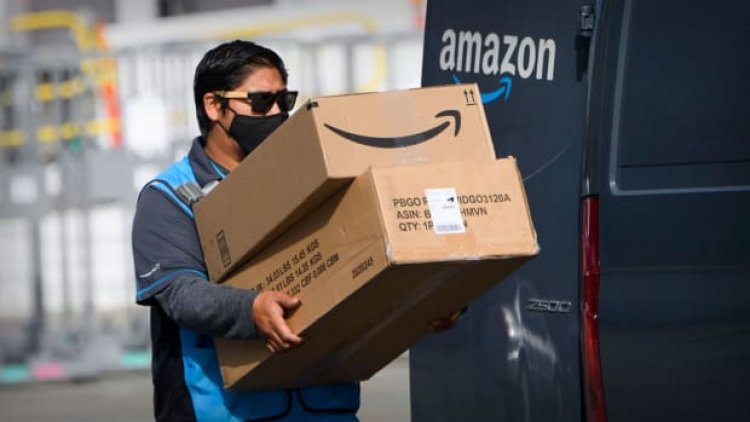Amazon Adds a Warning Shoppers Will Really Love
Products that don't delight customers are being watched closely.

Products that don't delight customers are being watched closely.
Manufacturers and vendors take note: Amazon (AMZN) - Get Free Report is cracking down on your crappy stuff.
The e-commerce giant is reportedly slapping “frequently returned” notices on products that consumers tend to ship back back to Amazon. The company is also advising shoppers to check item details and product reviews before pulling the trigger.
DON'T MISS: Amazon Is Considering a Surprising New Acquisition
The move comes as Amazon is trying to cut costs and boost profits. Reducing returns is a good way to accomplish both goals. Retailers see their profit margins shrink because they not only lose the sale but must devote resources to process returns. PATRICK T. FALLON/AFP via Getty Images
Returns Cost Amazon More than Just Time
In 2022, returns will account for 16.5% of the $1.29 trillion in total online sales, according to a report from the National Retail Federation. That’s actually a sizable improvement from 2021 when the return rate was nearly 21%.
E-commerce sales, which continued to grow at double digit rates each year, recently crossed the $1 trillion mark, according to the U.S. Census Bureau.
But in a sense, the freewheeling era of retailers blindly chasing online sales has come to an end, said retail consultant and former Amazon strategist Brittain Ladd.
“It’s not enough anymore just to generate large online sales,” Ladd said. “Customers need to be profitable.”
As do vendors. Internally, Amazon has a term to describe unprofitable sales: C.R.A.P., which stands for Can’t Realize A Profit.
Slapping labels on frequently returned items is just one way Amazon is pressuring sellers.
Amazon Is Getting Smart with Unsatisfactory Products
Martin Heubel, a former Amazon category manager who now advises companies on how to sell their brands on the platform, says the company is increasingly using algorithms to weed out unprofitable products.
If a product falls below a sales/profit threshold, the algorithm automatically alerts the seller that Amazon might reduce how often it offers the merchandise, said Heubel, who’s based in London.
Normally, a vendor could plead its case to an Amazon representative. “You need a person to negotiate with,” Huebel said.
But Huebel suspects that Amazon will increasingly rely on automation and algorithms to manage vendors given the thousands of jobs the company recently eliminated.
In addition, Amazon is pressing vendors to provide it with more cash to support their brands. In the retail world, manufacturers pay what’s called “trade allowances” which retailers publicly describe as marketing investments.
In truth, Huebel said, manufacturers pay retailers this money in order to gain prominent space in the physical or online store. Retailers heavily depend on this cash to boost their profit margins.
Shoppers may not care much about Amazon’s vendor crackdown. And in many ways, they could benefit from things like “frequently returned” labels.
“We’re always innovating on behalf of customers to improve the shopping experience,” Amazon spokesperson Betsy Harden said in an email to media outlets. “We’re currently showing return rate information on some product detail pages to help our customers make more informed purchase decisions.”
But there are consequences that shoppers might not like.
Given the rising cost and complexity of dealing with Amazon, vendors might just stop selling through the platform altogether, Huebel said. And that reduces the choices of what consumers can buy on Amazon, he said.
Or they might just pass on the cost of doing business with Amazon to the consumers by raising prices, Huebel said.
And vendors and bad products are not the only source of money losing returns. There are plenty of shoppers who like to buy things and then return them.
Ladd says Amazon will likely crack down on them too. For example, the company could limit or even eliminate their ability to ship back orders.
Either way, buying and selling on Amazon just got a lot more complicated as the retailer looks to wring more profit out of its business.
What's Your Reaction?



























































